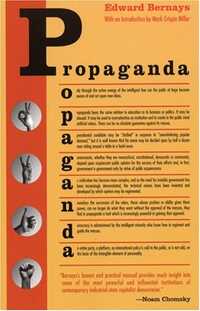
Propaganda
Chapter 3
The New Propagandists
- Author :: Edward Bernays
- Publication Year :: 1928
- Posted: July 6, 2024
Important
Very important
Chapter 3 - The New Propagandists
page 26
-
Who are the men who, without our realizing it, give us our ideas , tell us whom to admire and whom to despise, what to believe about the ownership of public utilities, about the tariff, about the price of rubber, about the Dawes Plan, about immigration; who tell us how our houses should be designed, what furniture we should put into them, what menus we should serve on our table, what kind of shirts we must wear, what sports we should indulge in, what plays we should see, what charities we should support, what pictures we should admire, what slang we should affect, what jokes we should laugh at?
-
If we set out to make a list of the men and women who, because of their position in public life, might fairly be called the molders of public opinion, we could quickly arrive at an extended list of persons mentioned in “Who’s Who."
page 27:
-
It would obviously include, the President of the United States and the members of his Cabinet; the Senators and Representatives in Congress; the Governors of our forty-eight states; the presidents of the chambers of commerce in our hundred largest cities, the chairmen of the boards of directors of our hundred or more largest industrial corporations, the president of many of the labor unions affiliated in the American Federation of Labor, the national president of each of the national professional and fraternal organizations, the president of each of the racial or language societies in the country, the hundred leading newspaper and magazine editors, the fifty most popular authors, the presidents of the fifty leading charitable organizations, the twenty leading theatrical or cinema producers, the hundred recognized leaders of fashion, the most popular and influential clergymen in the hundred leading cities, the presidents of our colleges and universities and the foremost members of their faculties, the most powerful financiers in Wall Street, the most noted amateurs of sport, and so on.
-
Such a list would comprise several thousand persons. But it is well known that many of these leaders are themselves led, sometimes by persons whose names are known to few. Many a congressman, in framing his platform, follows the suggestions of a district boss whom few persons outside the political machine have ever heard of.
-
AIPAC guy.
-
A presidential candidate may be “drafted” in response to “overwhelming popular demand,” but it is well known that his name may be decided upon by half a dozen men sitting around a table in a hotel room.
page 28:
-
In some instances the power of invisible wire-pullers is flagrant. The power of the invisible cabinet which deliberated at the poker table in a certain little green house in Washington has become a national legend. There was a period in which the major policies of the national government were dictated by a single man, Mark Hanna.
-
Hanna was a businessman that is credited with developing the modern political campaign tactic by which a consistent message is delivered to the audience. During the late 1800s and very early 1900s he engineered nominations and elections.
-
Such persons typify in the public mind the type of ruler associated with the phrase invisible government. But we do not often stop to think that there are dictators in other fields whose influence is just as decisive as that of the politicians I have mentioned.
page 29:
-
There are invisible rulers who control the destinies of millions. It is not generally realized to what ex- tent the words and actions of our most influential public men are dictated by shrewd persons operating behind the scenes.
-
Nor, what is still more important, the extent to which our thoughts and habits are modified by authorities.
-
In some departments of our daily life, in which we imagine ourselves free agents, we are ruled by dictators exercising great power. A man buying a suit of clothes imagines that he is choosing, according to his taste and his personality, the kind of garment which he prefers. In reality, he may be obeying the orders of an anonymous gentleman tailor in London.
-
He goes on to tell a similar tale to that of the velvet propaganda in chapter 2 but for men’s suits.
-
I am reminded of the quote: “None are more hopelessly enslaved than those who falsely believe they are free.” ― Johann Wolfgang von Goethe
page 30:
-
Different men rule us in the various departments of our lives. There may be one power behind the throne in politics, another in the manipulation of the Federal discount rate, and still another in the dictation of next season’s dances. If there were a national invisible cabinet ruling our destinies (a thing which is not impossible to conceive of) it would work through certain group leaders on Tuesday for one purpose, and through an entirely different set on Wednesday for another.
-
The FED today (and probably always) has been political even though they say they are not. I think the better question is: who is the dog and who is the tail? Does the government wag the FED or does the FED wag the government?
page 31:
-
The idea of invisible government is relative. There may be a handful of men who control the educational methods of the great majority of our schools. Yet from another standpoint, every parent is a group leader with authority over his or her children.
-
The invisible government tends to be concentrated in the hands of the few because of the expense of manipulating the social machinery which controls the opinions and habits of the masses. To advertise on a scale which will reach fifty million persons is expensive. To reach and persuade the group leaders who dictate the public’s thoughts and actions is likewise expensive.
-
For this reason there is an increasing tendency to concentrate the functions of propaganda in the hands of the propaganda specialist. This specialist is more and more assuming a distinct place and function in our national life.
-
Maybe the first “justification” for why this propagandizing power “must” be in the hands of the few - money. In reality this argument still falls flat. Even if we assume there are “propaganda specialists”, they still need to deliver their propaganda and it would be as costly as any other group delivering a message unless we are to assume that these specialists can somehow do more with less (a not wholly unimaginable possibility).
-
New activities call for new nomenclature. The propagandist who specializes in interpreting enterprises and ideas to the public, and in interpreting the public to promulgators of new enterprises and ideas, has come to be known by the name of public relations counsel."
-
The new profession of public relations has grown up because of the increasing complexity of modern life and the consequent necessity for making the actions of one part of the public understandable to other sectors of the public.
-
Here he is again making allusions to the public being stupid.
page 32:
-
Governments, whether they are monarchical, constitutional, democratic or communist, depend upon acquiescent public opinion for the success of their efforts and, in fact, government is only government by virtue of public acquiescence.
-
Government is government because it has a monopoly on force. Very few would go along with the modern US Government if it didn’t have the force to compel the citizens into compliance. The shortest and simplest example of this is: pay your taxes or you will be thrown into a cage.
-
Industries, public utilities, educational movements, indeed all groups representing any concept or product, whether they are majority or minority ideas, succeed only because of approving public opinion. Public opinion is the unacknowledged partner in all broad efforts.
-
This is again no longer true and likely was never true. The public has made know what it feels about numerous products and the manufacturers have not taken any of the feedback into consideration. The modern movie and video game industries are glaring examples where the audience is en mass walking away because of what we might call “woke” injection into every once loved franchise. These companies, like Disney, seem to not care that their products are flopping left and right. Are they making up for the loss of (sometimes in the hundreds of millions) revenue with sweetheart DEI/CEI ratings fueled loans from the likes of Blackrock, Vanguard, and State Street?
-
The public relations counsel, then, is the agent who, working with modern media of communication and the group formations of society, brings an idea to the consciousness of the public. But he is a great deal more than that. He is concerned with courses of action, doctrines, systems and opinions, and the securing of public support for them.
-
He functions primarily as an adviser to his client, very much as a lawyer does. A lawyer concentrates on the legal aspects of his client’s business. A counsel on public relations concentrates on the public contacts of his client’s business. Every phase of his client’s ideas, products or activities which may affect the public or in which the public may have an interest is part of his function.
page 33:
-
The counsel on public relations is not an advertising man but he advocates advertising where that is indicated. Very often he is called in by an advertising agency to supplement its work on behalf of a client. His work and that of the advertising agency do not conflict with or duplicate each other.
-
Here we might even take a naive approach and assume Bernays is simply advocating for the hire of PR firms because it is in his financial interest.
-
The next few pages discuss how a PR firm would survey a market or audience and then advise their client on how to act or present themselves to the public. The end goal being maximized good will for the client.
page 36:
-
Within a decade, many large corporations were employing public relations counsel under one title or another, for they had come to recognize that they depended upon public good will for their continued prosperity. It was no longer true that it was “none of the public’s business” how the affairs of a corporation were managed. They were obliged to convince the public that they were conforming to its demands as to honesty and fairness. Thus a corporation might discover that its labor policy was causing public resentment, and might introduce a more enlightened policy solely for the sake of general good will.
-
“Convince the public” does not mean they will actually conform. They need only appear to conform “soley for the sake of general good will."
page 37:
-
The counsel on public relations must maintain constant vigilance, because inadequate information, or false information from unknown sources, may have results of enormous importance. A single false rumor at a critical moment may drive down the price of a corporation’s stock, causing a loss of millions to stockholders.
-
The PR groups never have inadequate information nor would they ever lie…
-
The counsel on public relations must be in a position to deal effectively with rumors and suspicions, attempting to stop them at their source, counteracting them promptly with correct or more complete information through channels which will be most effective, or best of all establishing such relations of confidence in the concern’s integrity that rumors and suspicions will have no opportunity to take root.
-
Where there is smoke, there is often fire. A lot of people were suspicious recently that Disney had racist hiring practices. Some undercover videos show a higher up explicitly stating that Disney would not hire white men. What was once a suspicion base on how Disney was acting is not backed by at least some testimonial evidence. Would Disney’s PR team would have wanted to “deal effectively” with this leak? Would they have buried the story if they could have? If so, what happened to the “truth is mighty and must prevail” that we saw Bernays and Scientific America claiming in chapter 2?
page 38:
-
If we accept public relations as a profession, we must also expect it to have both ideals and ethics. The ideal of the profession is a pragmatic one.
-
So pragmatism trumps (“the ideal of the profession”) ethics? For the propagandist, I agree.
page 39:
-
It (PR) aims to bring about an understanding between educators and educated, between government and people, between charitable institutions and contributors, between nation and nation.
-
I thought it was, from chapter 1 paragraph 1, to mold out minds, form out tastes, and suggest our ideas.
- We are governed, our minds are molded, our tastes formed, our ideas suggested, largely by men we have never heard of.
-
I suppose Bernays is trying to separate the low level PR firms from the high level PR firm that presumably issues its decrees thought its lower level tentacles.
-
The profession of public relations counsel is developing for itself an ethical code which compares favorably with that governing the legal and medical professions.
-
I don’t know that I would want to strive for an ethical code of lawyers, ever. And since 2020 (likely before even then) I would argue against orienting toward medical ethics as well.
-
While recognizing, just as the lawyer does, that every one has the right to present his case in its best light, he nevertheless refuses a client whom he believes to be dishonest, a product which he believes to be fraudulent, or a cause which he believes to be antisocial.
-
“Best light” often leads to lies (often of omission). With hindsight being 20-20, we can see that MANY products/services have been marketed that were known to be dishonest, fraudulent, and antisocial. Hell, social media itself is widely accepted as antisocial, divisive, and likely one of the causes for the increase in young girls committing suicide. Many of the creators and founders of social media forbid their children from using it because they have firsthand knowledge of how damaging it is.
-
- Asbestos, glyphosate, etc. For years people were claiming (rightfully so) that these were damaging products and only after decades were they finally pulled from the shelves.
-
Or what about everyone promoting the old dot com boom/bust era frauds? The fraudulent ratings on mortgage backed securities leading up to the Global Financial Crisis? Worldcom? Tyco? Enron? Theranos? MF Global? This is off the top of my head and all post 2000.
-
In public opinion, the public relations counsel is judge and jury, because through his pleading of a case the public may accede to his opinion and judgment.
-
Wouldn’t the customers be the judge and jury? (and, via boycott, executioner?) The PR team would be more akin to the lawyers. Like he stated literally earlier in the same paragraph.
page 40:
-
It must be repeated that his business is not to fool or hoodwink the public. If he were to get such a reputation, his usefulness in his profession would be at an end. When he is sending out propaganda material, it is clearly labeled as to source. The editor knows from whom it comes and what its purpose is, and accepts or rejects it on its merits as news.
-
It sounds good, but it never plays out that way. Again his business might not be to hoodwink, but to “mold out minds, form out tastes, and suggest our ideas.” Much better…
-
I can’t speak for 100 years ago, but over the last several decades there has been a huge rise in “anonymous sources” making all kinds of claims.




